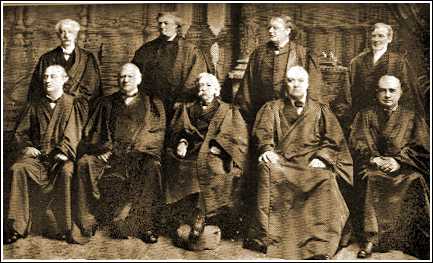FRtR > Documents > Plessy v. Ferguson (1896)
Supreme Court
Plessy v. Ferguson 1896
Comment
*** Quote *
Text ***

There has been an ongoing debate among historians over the origins of
racial segregation in this country in the decades after emancipation.
One group of scholars has argued that segregation was not a
predestined pattern of racial relations in the post-war South. White
masters and black slaves had lived and worked in close proximity
before the Civil War, and a variety of patterns of racial relations
existed in the 1870s and 1880s. Although southern states did not
erect the legal structures that supported an extensive system of
social, economic and political segregation until the 1890s, white
hostility had permeated southern race relations for over two
centuries. What is certain is that the traditions of racism, white
hostility toward blacks and the inability of the black minority to
protect itself after northern troops went home disadvantaged the
former slaves from the start.
Every southern state had enacted black codes immediately after the war
to keep the former slaves under tight control. After these had been
voided by the Union, white southerners began exploring other means to
maintain their supremacy over blacks. Southern legislatures enacted
criminal statutes that invariably prescribed harsher penalties for
blacks than for whites convicted of the same crime, and erected a
system of peonage that survived into the early twentieth century.
In an 1878 case, the Supreme Court ruled that the states could not
prohibit segregation on common carriers, such as railroads, streetcars
or steamboats. Twelve years later, it approved a Mississippi statute
requiring segregation on intrastate carriers. In doing so it
acquiesced in the South's solution to race relations.
In the best known of the early segregation cases, Plessy v. Ferguson
(1896), Justice Billings Brown asserted that distinctions based on
race ran afoul of neither the Thirteenth or Fourteenth Amendments, two
of the Civil War amendments passed to abolish slavery and secure the
legal rights of the former slaves.
Although nowhere in the opinion can the phrase "separate but equal" be
found, the Court's rulings approved legally enforced segregation as
long as the law did not make facilities for blacks inferior to those
of whites.
In his famous and eloquent dissent, Justice Harlan protested that
states could not impose criminal penalties on a citizen simply because
he or she wished to use the public highways and common carriers. Such
laws defeated the whole purpose of the Civil War amendments. His
pleas that the "Constitution is color-blind" fell on deaf ears.
For further reading: C. Vann Woodward, The Strange Career of Jim Crow
(2d ed., 1966); William Gillette, Retreat from Reconstruction (1979);
and Charles A. Lofgren, The Plessy Case (1987).
